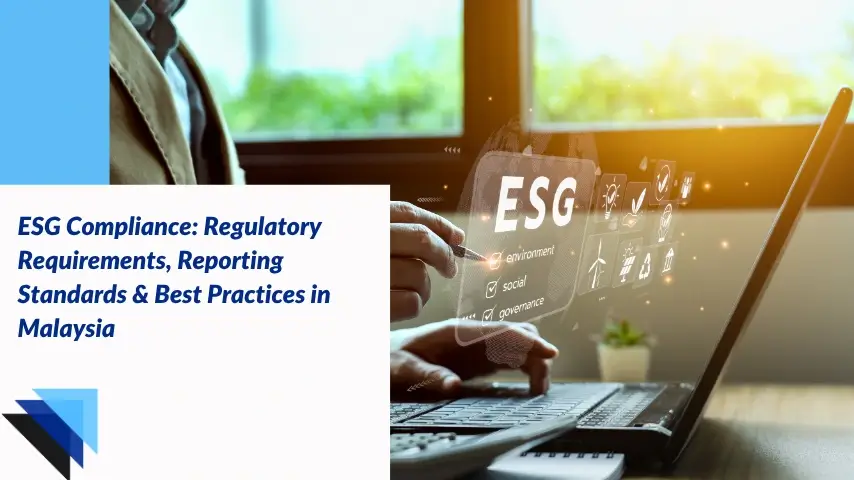ESG compliance represents a company’s effort to follow principles related to environmental care, social responsibility, and ethical governance. It entails putting measures in place to lessen environmental impact, foster social responsibility, and maintain ethical governance. ESG compliance is crucial for meeting regulatory requirements, attracting investors, and fostering sustainable growth while addressing the expectations of stakeholders and the broader community.
The prominence of Environmental, Social, and Governance (ESG) compliance has risen significantly on the global stage, and Malaysia is no exception. ESG compliance is foundational for businesses aiming to maintain relevance, adapt to evolving regulations, and meet rising stakeholder expectations. It reflects a company’s dedication to responsible operations, emphasizing that true sustainable growth encompasses environmental care, social accountability, and strong governance alongside financial performance.
Several drivers have elevated ESG as a priority for organizations in Malaysia. These include regulatory developments, mounting pressure from investors and international markets, and the urgency to address climate-related risks. Stakeholders (ranging from regulators and financial institutions to consumers and civil society) are holding Malaysian businesses to higher standards of accountability. Businesses that fail to adapt risk losing competitiveness, while those that embrace ESG can enjoy improved investor confidence, access to capital, and enhanced brand reputation.
This article explores the landscape of ESG compliance in Malaysia, examining the prevailing regulatory architecture, relevant reporting frameworks, best practices for organizations, and the key challenges and opportunities in this rapidly evolving field. By understanding the latest legal, operational, and market expectations, Malaysian businesses can better position themselves for sustainable growth in an era where ESG has become integral to corporate strategy.
Is Your Business Prepared for ESG Compliance?
Start your ESG journey with expert guidance tailored to Malaysian regulations and industry standards.
- What are the regulatory requirements for ESG compliance in Malaysia?
- What are the key ESG reporting standards applicable in Malaysia?
- What are the best practices for effective ESG implementation in Malaysian companies?
- What challenges and opportunities do Malaysian businesses face in implementing ESG compliance?
- How Wellkinetics Can Help
What are the regulatory requirements for ESG compliance in Malaysia?
Malaysia’s ESG compliance is shaped by the Securities Commission’s governance code, Bank Negara’s climate taxonomy, and Bursa Malaysia’s sustainability reporting requirement. Companies must adopt ESG principles into operations and disclose related activities, aligning their strategies with both national policies and international agreements like the Paris Agreement and United Nations Sustainable Development Goals.
How is Malaysia committed to ESG compliance through its regulatory framework?
Malaysia’s commitment to ESG compliance is reflected in a multi-layered regulatory environment that is expanding to meet both national and global sustainability targets. The country is in a period of ESG regulatory transformation, fueled by increased global attention and domestic policy innovation.
The Securities Commission of Malaysia (SC) is instrumental in advancing the ESG agenda in capital markets. In 2017, it introduced updates to the Malaysian Code on Corporate Governance (MCCG), aimed at improving transparency in sustainability practices and encouraging the integration of ESG considerations into corporate governance. The updated Code highlights the importance of board oversight, robust risk management, and clear reporting as essential elements for embedding ESG values into business operations.
Bank Negara Malaysia (BNM) serves as the regulatory authority overseeing financial institutions in Malaysia. Recognizing the significant impact of climate risk and the need for green finance, BNM launched the Climate Change and Principle-based Taxonomy (CCPT) in 2021. This taxonomy provides banks and insurers with clear guidance for classifying economic activities according to environmental impact, encouraging a shift of capital toward green and sustainable sectors. The CCPT aligns the financial system with climate action and serves as a foundation for further reforms, such as green lending incentives and responsible investment frameworks.
Malaysia’s Environmental Quality Act 1974 serves as the cornerstone of the country’s environmental legislation, obligating businesses to control pollution and meet established emission standards. The Act has been progressively updated to address emerging environmental challenges, and enforcement has intensified, particularly with respect to waste management and hazardous substances.
What are Bursa Malaysia’s sustainability disclosure requirements for listed companies?
Bursa Malaysia, as the nation’s stock exchange, requires all listed companies to issue annual sustainability statements in accordance with its Sustainability Reporting Framework (introduced in phases since 2015, with more rigorous requirements implemented in 2019 and beyond). This framework compels organizations to make meaningful, transparent disclosures on their management of ESG risks and opportunities. The ultimate objective is to foster long-term resilience in Malaysia’s listed ecosystem.
The Sustainability Reporting Framework outlines several mandatory requirements:
- Materiality Assessments: Organizations are expected to evaluate and disclose ESG issues that are most significant to their industry, business operations, and stakeholder interests.
- Stakeholder Engagement: Companies are obligated to actively interact with investors, customers, regulators, and communities to identify and address key ESG issues and priorities.
- Qualitative and Quantitative Disclosures: Reports should provide both narrative and data-driven evidence of ESG performance, including progress against stated metrics and targets.
Companies in high-impact sectors (including palm oil, energy, property, and manufacturing) face particularly stringent requirements. Firms that fail to meet reporting obligations can incur reputational risk, regulatory scrutiny, or, in certain cases, delisting threats.
Struggling with Sustainability Reporting?
Get expert support to meet Bursa Malaysia’s disclosure expectations efficiently.
What national policies and global commitments support Malaysia’s ESG regulatory framework?
Malaysia has reinforced its regulatory efforts through key national and international initiatives. The 11th Malaysia Plan (2016–2020) and the Twelfth Malaysia Plan (2021–2025) focus on achieving critical socio-economic and environmental objectives, including lowering greenhouse gas (GHG) emissions intensity and promoting greater use of renewable energy.
The government supports the National Renewable Energy Policy and Action Plan (NREPAP) to incentivize solar and other renewables, and it is actively promoting public-private partnerships in sustainable infrastructure development.
Internationally, Malaysia is a signatory to the Paris Agreement, committing to achieve a 45% reduction in national emissions intensity of GDP by 2030 (relative to 2005 levels). Malaysia has also formally adopted the UN Sustainable Development Goals (SDGs), ensuring that its regulatory trajectory remains closely aligned with global sustainability benchmarks.
What are the sector-specific ESG regulations and incentives in Malaysia?
Beyond broad regulatory mandates, sector-focused agencies such as the Malaysian Palm Oil Certification Council (MPOCC), and Malaysia Green Technology and Climate Change Centre (MGTC) establish additional ESG-related guidelines tailored to key industries. The Malaysian Sustainable Palm Oil (MSPO) certification has become compulsory, ensuring that plantation owners adhere to sustainable and ethical practices.
Incentive Example:
Recently, the Malaysian government has introduced a timely tax incentive aimed at accelerating ESG adoption across sectors. The recently gazetted P.U. (A) 193/2025 regulation allows eligible entities, including listed companies, financial institutions, SMEs, and Labuan entities, to claim up to RM50,000 per year for qualified ESG-related expenditures.
What can be claimed:
- Carbon accounting and verification
- ESG reporting systems or advisory
- Employee training and upskilling in ESG
- Tax compliance tools (including transfer pricing)
- E-invoicing setup (particularly for SMEs)
This incentive is applicable from Year of Assessment 2024 until 2027.
This incentive doesn’t just reward compliance, it reflects a policy shift that integrates ESG into mainstream business priorities. For organizations investing in sustainability initiatives, this is an opportunity to reduce costs while building long-term value and regulatory resilience.
What are the key ESG reporting standards applicable in Malaysia?
Key ESG reporting standards in Malaysia include the Bursa Malaysia Sustainability Reporting Framework, Global Reporting Initiative (GRI), SASB, and ISSB. Public listed companies must comply with Bursa Malaysia’s requirements, while many organizations voluntarily adopt international standards for greater transparency, comparability, and appeal to global investors.
What is the Bursa Malaysia Sustainability Reporting Framework and what does it require?
As the principal reporting requirement for listed firms, Bursa Malaysia’s framework adapts international best practices by:
- Mandating board-level responsibility for sustainability oversight
- Stipulating disclosures around ethics, labor, procurement, supply chain risks, and climate impact
- Providing sectoral guides for consistent and equitable sustainability communication
What is the Global Reporting Initiative (GRI) and how is it used by Malaysian companies?
The GRI Standards are the world’s most widely adopted framework for non-financial reporting, emphasizing transparency regarding the social and environmental impacts of business activities. Many leading Malaysian firms (including Petronas and Sime Darby) incorporate GRI disclosures in their annual sustainability reports.
What is the Sustainability Accounting Standards Board (SASB) and how is it applied in Malaysia?
SASB standards enable more granular, industry-specific ESG reporting, with emphasis on financial materiality. Although uptake in Malaysia is lower than in the USA or Europe, it is gaining traction among companies seeking to attract global funds or list on foreign exchanges.
What is the International Sustainability Standards Board (ISSB) and its relevance in Malaysia?
The International Sustainability Standards Board (ISSB) has introduced two global baseline standards, IFRS S1 and IFRS S2, to guide companies in disclosing sustainability-related information that is material to investors. IFRS S1 outlines the general requirements for reporting on all sustainability-related risks and opportunities, while IFRS S2 focuses specifically on climate-related disclosures, building upon the now-retired TCFD framework.
In Malaysia, regulators such as Bursa Malaysia are working toward phased adoption of both standards, beginning with IFRS S2 to support the country’s climate priorities and alignment with global investor expectations. Together, these standards aim to enhance transparency, comparability, and credibility in ESG reporting across sectors.
RELATED: Sustainability Frameworks: A Guide to Global Standards and Their Application in Malaysia
What is Integrated Reporting (IR) and how is it adopted in Malaysia?
Integrated Reporting highlights how an organization’s strategy, governance, and performance contribute to value creation in the short, medium, and long term. While not mandated, IR adoption is emerging among Malaysia’s largest conglomerates and government-linked companies (GLCs) to demonstrate the linkage between sustainability, business value, and stakeholder outcomes.
What are the benefits of adopting robust ESG reporting standards?
Companies that adopt best-practice ESG reporting, exceeding mere compliance, can unlock various advantages:
- Access to Sustainable Capital: Comprehensive ESG disclosures meet the expectations of international investors, banks, and rating agencies, impacting capital access and loan terms.
- Enhanced Reputation: Clear and transparent reporting highlights corporate responsibility, resonates with socially conscious consumers, and helps prevent negative media coverage or activist scrutiny.
- Operational Efficiency: Monitoring ESG metrics often highlights resource inefficiencies or risks in the supply chain, prompting improvements.
- Benchmarking and Continuous Improvement: Using recognized standards enables organizations to benchmark performance against peers both regionally and globally.
What are the common challenges Malaysian companies face in ESG reporting?
Malaysian companies encounter a wide array of challenges in achieving effective ESG reporting:
- Data Collection and Verification: Many lack mature systems to collect reliable sustainability data, making compliance slow and costly.
- Resource Limitations: For SMEs in particular, the lack of necessary skills and budget often poses significant challenges to producing comprehensive ESG reports.
- Complexity of Multiple Frameworks: Companies often struggle to harmonize local regulations (e.g., Bursa Malaysia) with global standards (e.g., GRI, IFRS), leading to reporting overload.
- Ensuring Materiality: Defining which issues are “material” for stakeholders requires research, dialogue, and careful judgement.
Not Sure Which ESG Framework to Use?
We help you choose the right mix of GRI, SASB, IFRS, and Bursa Malaysia guidelines.
What are the best practices for effective ESG implementation in Malaysian companies?
Key ESG best practices for Malaysian companies involve integrating ESG into business strategy, securing leadership commitment, performing materiality assessments, establishing measurable objectives, engaging with stakeholders, and utilizing technology for transparent data management. These actions not only support regulatory compliance but also strengthen long-term resilience and bolster reputation.
How can ESG be effectively integrated into corporate strategy?
The effectiveness of ESG performance lies in its seamless integration into corporate strategy and everyday operations, rather than relying solely on annual disclosures.
- Board and Leadership Commitment: The board must set the tone, and senior management should champion ESG, incorporating it into business objectives and risk management.
- Materiality Assessments and Stakeholder Mapping: Engage directly with stakeholders, from community leaders to global investors, to pinpoint the most critical ESG issues.
- Goal Setting and KPIs: Establish specific, measurable targets for areas like emissions, diversity, safety, and supply chain standards, integrating them into performance management systems.
- Policy and Training: Develop formal ESG policies and provide employee training programs to embed sustainability deeply into the organization’s culture.
Example:
Petronas has created a dedicated sustainability division and set public ESG targets, including achieving net zero carbon emissions by 2050. These initiatives establish clear benchmarks for its strategy, investments, and daily operations.
How are companies investing in sustainable innovation to advance ESG goals?
Companies leading in ESG compliance harness innovation to mitigate risks, tap into new markets, and lower costs.
- Energy Efficiency: Manufacturers are adopting high-efficiency machinery, LED lighting, green building certifications like GreenRE and LEED, and advanced energy management systems.
- Green Products and Services: Banks offer sustainability-linked loans with preferential rates for borrowers meeting ESG criteria. For example, CIMB’s “Sustainability-Linked Financing” incentivize ESG performance by offering reduced interest rates tied to specific sustainability metrics.
- Waste Reduction and Circular Economy: Food producers are collaborating with technology companies to convert waste into products like animal feed or biodegradable packaging, aiming to decrease landfill dependency.
Statistic:
Malaysia’s green technology sector is projected to reach RM100 billion in value by 2030, according to the Malaysia Green Technology and Climate Change Centre (MGTC), reflecting a growing focus on sustainability-driven innovation.
How does transparency and data management enhance ESG compliance?
Robust ESG compliance is reliant on accurate, meaningful, and accessible data.
- Adoption of Technology: Leveraging cloud-based platforms and automated data collection tools simplifies ESG tracking and facilitates real-time reporting.
- Third-Party Assurance: Independent audits of sustainability data and reports bolster the reliability of ESG commitments.
- Regular Communication: Providing consistent updates to stakeholders via press releases, workshops, or investor briefings fosters trust and helps address ESG-related risks proactively.
Example:
Maybank, the leading bank in Malaysia, frequently shares updates on its sustainability initiatives and employs independent verification to ensure the credibility of its environmental and social impact data.
How can organizations effectively engage stakeholders in their ESG efforts?
Engaging proactively with stakeholders enables organizations to both develop and effectively convey their ESG agenda.
- Employee Involvement: Provide staff with ESG-related training and incentives to encourage sustainable behavior. For example, some organizations now link bonuses to safety, community engagement, and environmental performance metrics.
- Community Collaboration: Partner with local communities and NGOs to support social and environmental projects—such as reforestation, educational programs, and clean energy access.
- Supply Chain Management: Work collaboratively with suppliers to raise ESG standards and ensure ethical sourcing, which is critical for export-dependent sectors like electronics and agriculture.
Example:
Nestlé Malaysia has partnered with smallholder farmers to boost productivity, support livelihoods, and uphold sustainability standards, creating robust and ethical supply chains.
Need Help Embedding ESG Into Your Business Strategy?
Let our consultants guide your leadership and operations teams for measurable ESG success.
What challenges and opportunities do Malaysian businesses face in implementing ESG compliance?
Malaysian businesses can navigate challenges effectively while unlocking opportunities for market expansion, enhancing risk management strategies, and fostering deeper trust and credibility among stakeholders with a commitment to strong ESG practices.
What are the main challenges Malaysian businesses face in ESG compliance?
While Malaysia has advanced rapidly in sustainability, several persistent challenges remain:
- Resource Constraints: SMEs make up over 95% of Malaysia’s registered businesses but often lack the capacity for thorough ESG assessments and reporting.
- Fragmented Data Systems: Organizations often depend on outdated or manual systems, leading to inconsistent and disjointed ESG data collection processes.
- Knowledge and Skills Gap: A shortage of ESG expertise, coupled with limited local training programs for sustainability professionals and assurance providers, hinders progress in this area.
- Evolving Regulation: The ESG legislative environment is dynamic. Frequent updates or new guidance can create compliance dilemmas and add complexity.
- Global Pressures: Companies serving overseas markets must comply with not just domestic requirements, but also foreign standards such as the EU’s Corporate Sustainability Reporting Directive (CSRD) or the US Securities and Exchange Commission’s proposed rules on climate disclosures. This “double compliance burden” can be daunting.
What opportunities does ESG compliance offer for Malaysian businesses?
Despite the challenges, ESG compliance serves as a catalyst for growth, innovation, and sustainable long-term value creation.
- Access to International Markets: Demonstrating ESG excellence opens doors to foreign investment, export contracts, and public procurement opportunities tied to sustainability outcomes.
- Competitive Advantage: Strong ESG credentials set brands apart in industries like food production, hospitality, and retail, where consumer trust and reputation are critical to success.
- Economic Resilience: Companies with proactive ESG strategies tend to weather shocks—such as the COVID-19 pandemic or climate disasters—better than laggards. They are able to attract and retain talent, win over discerning consumers, anticipate regulatory risks, and adapt swiftly to change.
- Incentives for Green Investment: The growth of green finance, including green sukuk (Islamic bonds), promotes sustainable investments by reducing capital costs for ESG-compliant projects. Malaysia is a recognized global leader in Islamic green finance.
Example:
Since launching the world’s first green sukuk in 2017, Malaysia has seen the value of green Islamic bonds issued exceed RM6 billion. According to the Securities Commission Malaysia’s 2021 Annual Report, RM6 billion of these sukuk were issued under the ASEAN Green Bond Standards. These funds have supported investments in renewable energy, green buildings, and sustainable transportation, as reported by Salaam Gateway in 2021.
Statistic:
According to MSCI ESG Research, the number of Malaysian companies included in major ESG indexes more than doubled between 2018 and 2023, reflecting a growing emphasis from global investors.
How Wellkinetics Can Help
As Malaysian businesses tackle the intricate challenges of ESG compliance, the demand for expert guidance and comprehensive solutions becomes increasingly critical. Wellkinetics is well-positioned to support organizations at every stage of their ESG journey, leveraging industry expertise and innovative technology to help companies achieve their sustainability goals.
1. Comprehensive ESG Consulting:
Wellkinetics offers tailored consulting services to identify material ESG issues, align internal practices with regulatory and global standards, and develop pragmatic roadmaps for compliance. This includes undertaking materiality assessments, engaging stakeholders through dedicated programs, and conducting gap analyses to identify areas for enhancement and drive meaningful change.
2. Advanced Data Management Solutions:
Accurate data collection and management are critical to effective ESG reporting. Wellkinetics provides end-to-end data management platforms that enable seamless tracking, validation, and analysis of ESG metrics. With robust data analytics and visualization tools, businesses gain actionable insights, monitor progress, and ensure transparency in disclosures.
3. Streamlined Reporting and Disclosure:
Navigating evolving reporting frameworks can be challenging. Wellkinetics assists organizations in preparing sustainability reports in accordance with frameworks such as Bursa Malaysia’s Sustainability Reporting Guide, GRI, SASB, and ISSB. Wellkinetics enhances ESG communications by automating reporting processes and standardizing disclosures, minimizing administrative effort while boosting credibility.
4. Ongoing Training and Support:
The regulatory landscape is dynamic, with new standards and expectations emerging regularly. Wellkinetics offers continuous training programs and support to ensure teams remain up-to-date with best practices and can respond proactively to changing compliance requirements.
By partnering with Wellkinetics, Malaysian businesses can confidently address ESG obligations, mitigate risks, and unlock opportunities for growth and market leadership in the evolving sustainability ecosystem.
References and Further Reading
- Bursa Malaysia Sustainability Reporting Guide
- Securities Commission Malaysia, Malaysian Code on Corporate Governance (MCCG)
- Attorney General’s Chambers of Malaysia, Income Tax (Deduction for Expenditure in relation to Environmental Preservation, Social and Governance) Rules 2025 (P.U. (A) 193/2025)
- Bank Negara Malaysia, Climate Change and Principle-based Taxonomy (CCPT)
- Malaysia Green Technology and Climate Change Centre (MGTC)
- United Nations Sustainable Development Goals




